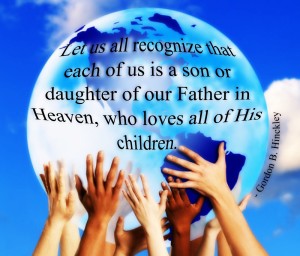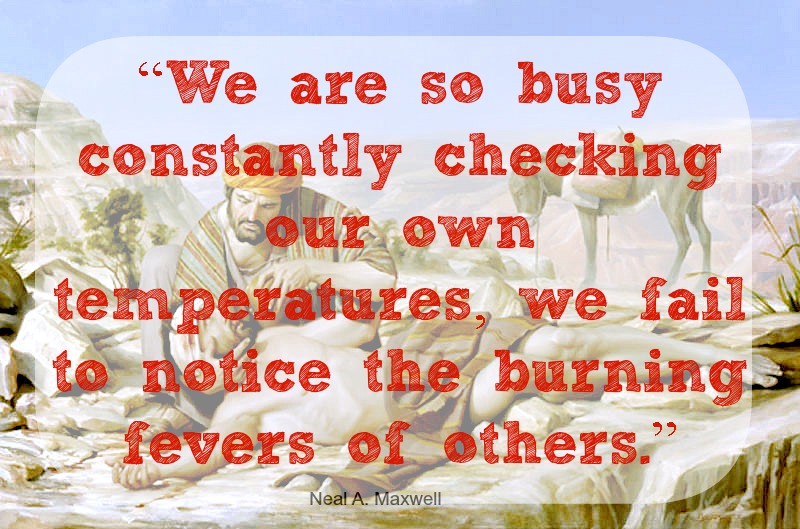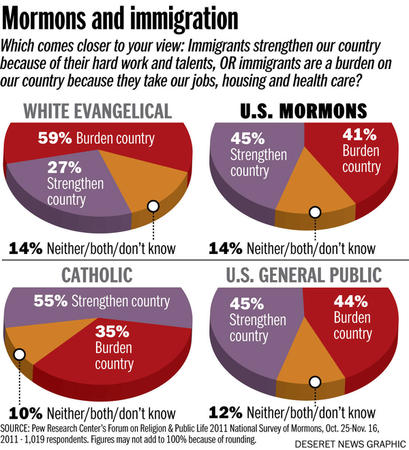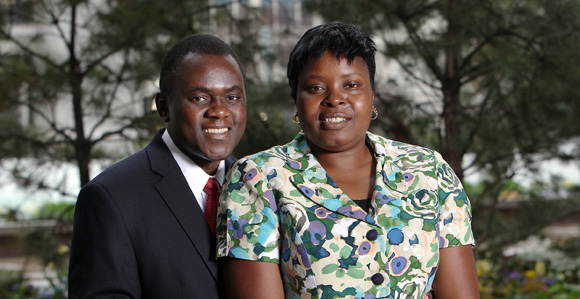The Church of Jesus Christ of Latter-day Saints (inadvertently referred to as the Mormon Church by the media and others) has witnessed a growth rate of 45% in its membership in the United States over the past decade. This increase is due largely in part to the growing number of its Spanish-speaking converts.
 According to an article by Jack Rodolico on the Fronteras website titled Mormon Missionaries without Papers, the number of Spanish –speaking members of The Church of Jesus Christ has doubled since the year 2000. Rodolico goes on to point out that many of those Latino members do not have the proper legal documentation for being in the United States, which in turn causes problems for the LDS Church, and especially for those Latino members desiring to serve full-time missions.
According to an article by Jack Rodolico on the Fronteras website titled Mormon Missionaries without Papers, the number of Spanish –speaking members of The Church of Jesus Christ has doubled since the year 2000. Rodolico goes on to point out that many of those Latino members do not have the proper legal documentation for being in the United States, which in turn causes problems for the LDS Church, and especially for those Latino members desiring to serve full-time missions.
The Church of Jesus Christ of Latter-day Saints Statement on Immigration
On 10 June 2011, The Church of Jesus Christ of Latter-day Saints issued an official statement concerning the immigration issue. The statement reads as follows:
Around the world, debate on the immigration question has become intense. That is especially so in the United States. Most Americans agree that the federal government of the United States should secure its borders and sharply reduce or eliminate the flow of undocumented immigrants. Unchecked and unregulated, such a flow may destabilize society and ultimately become unsustainable.
As a matter of policy, The Church of Jesus Christ of Latter-day Saints discourages its members from entering any country without legal documentation, and from deliberately overstaying legal travel visas.
What to do with the estimated 12 million undocumented immigrants now residing in various states within the United States is the biggest challenge in the immigration debate. The bedrock moral issue for The Church of Jesus Christ of Latter-day Saints is how we treat each other as children of God.
The history of mass expulsion or mistreatment of individuals or families is cause for concern especially where race, culture, or religion are involved. This should give pause to any policy that contemplates targeting any one group, particularly if that group comes mostly from one heritage.
As those on all sides of the immigration debate in the United States have noted, this issue is one that must ultimately be resolved by the federal government.
The Church of Jesus Christ of Latter-day Saints is concerned that any state legislation that only contains enforcement provisions is likely to fall short of the high moral standard of treating each other as children of God.
The Church supports an approach where undocumented immigrants are allowed to square themselves with the law and continue to work without this necessarily leading to citizenship.
In furtherance of needed immigration reform in the United States, The Church of Jesus Christ of Latter-day Saints supports a balanced and civil approach to a challenging problem, fully consistent with its tradition of compassion, its reverence for family, and its commitment to law.
In addition to the official statement, the LDS Church issued a brief statement to its members encouraging them to not be judgmental of any of the members in their congregations. It is the firm belief and affirmation of the LDS Church that any and all faithful, and worthy members should be afforded the privilege of being ordained to the Priesthood and attending the Temple, regardless of their immigration status.
The Church of Jesus Christ and Immigration Reform
On Friday, 8 March 2013, President Dieter F. Uchtdorf, Second Counselor in the First Presidency of The Church of Jesus Christ, himself a German immigrant, and 13 other national faith leaders, met with President Barack Obama to discuss immigration reform. According to the article in the Salt Lake Tribune dated 8 March 2013, “the president asked them to support a reform effort that would streamline the legal immigration system and create a pathway to citizenship for the 11 million undocumented immigrants in the country.”
The article further comments that in an interview with the Salt Lake Tribune following the meeting with President Obama, President Uchtdorf gave the following remarks:
He just said in this value process we need to stand together and make sure the United States is still a place where people can come and, once they come, feel not at fear. And do it, of course, in a lawful way. He was talking about his principles and what he said was totally in line with our [The Church of Jesus Christ of Latter-day Saints] values. [1]
Mormon Missionaries and the Issue of Immigration
With the announcement by President Thomas S. Monson, President and Prophet of The Church of Jesus Christ, at the opening of the 183rd Annual General Conference that the age requirements for serving a full-time mission has been lowered for both young men and young women, many have willingly and faithfully responded to the call to serve. Among those who have answered the call to serve are those who are not legal citizens of the United States. The quandary that the Church then faces is what is to become of those who are of legal age and want to go out and serve a mission, but yet they do not have legal documentation.
Rodolico in his article Mormon Missionaries without Papers states, “If the Mormon Church continues to grow at current rates, it will be majority Latin American by 2015.”
In his article he relates the account of a young man named Isaac (Isaac is his middle name) who was prepared to serve an LDS mission. Isaac moved with his family from Mexico when he was only 18 months old. His father, Rafael, was baptized a member of The Church of Jesus Christ at the age of 17 in Mexico City. At the young age of 5, Isaac’s father was killed in a car accident. When Isaac turned 18 and was anxiously engaged in preparing to serve a mission, his mother informed him that he is not a legal citizen of the United States, but he is indeed an illegal immigrant from Mexico.
According to the article, there have been many illegal immigrants who have served LDS missions, but the matter was not brought to the forefront until 2009 when immigration officials at an Ohio airport arrested a Latino missionary. This incident caused great concern for the Church, for parents, and for missionaries.
The Mormon Church declined to comment on this story, but it has clearly taken steps along the way to protect itself and its missionaries. In 2005, it backed an amendment by a Utah Senator to a federal law giving churches immunity for having undocumented immigrants do volunteer service, including serving missions. Over the years, the church has developed an evolving “Don’t Ask, Don’t Tell” policy on its undocumented missionaries. [2]
The Resolution
So, what is the resolution to the problem of illegal immigrants desiring to serve an LDS mission? The article states “by the time Isaac went on his mission, the church was encouraging these missionaries to accept assignments in the U.S., off airplanes, within a long drive from home.” [2]
Isaac was able to serve his mission in Colorado. He commented, “When we let fear take over us, we lose faith, and when we lose faith, we don’t have a future.” [2] The article concludes by stating that, “Two years later, Isaac is now applying for the Obama administration’s Deferred Action for Childhood Arrivals program. If approved, he can go to college without fear of deportation.” [2]
Addition Resources:
Official LDS Church Statement on Immigration
Basic Mormon Beliefs and Real Mormons
Two Mormon Missionaries Tell Their Stories
About Keith L. Brown
Keith L. Brown is a convert to The Church of Jesus Christ of Latter-day Saints, having been born and raised Baptist. He was studying to be a Baptist minister at the time of his conversion to the LDS faith. He was baptized on 10 March 1998 in Reykjavik, Iceland while serving on active duty in the United States Navy in Keflavic, Iceland. He currently serves as the First Assistant to the High Priest Group for the Annapolis, Maryland Ward. He is a 30-year honorably retired United States Navy Veteran.



